Loja expat overcomes hardship to improve the lives of children and insists, ‘I want to live until I die’
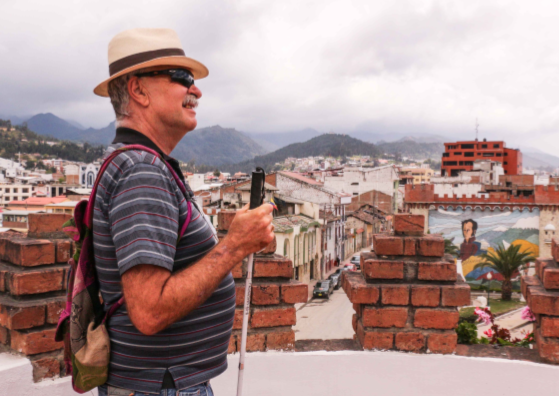
Jim Paradiso on top of the Puerta de la Ciudad in Loja.
Text and photos by Angie Gray
I make my way through the city of Loja, overwhelmed by its profound vivacity. The sound of drilling and hammering pierces the air around me, accompanied by the constant hum of traffic. I finally reach my destination, Gran Aki, a large supermarket where Jim Paradiso had agreed to meet me. As I approach the store entrance, my gaze rests on a tall man with a Panama hat, a fabric backpack radiating green and pink, a pair of sunglasses and a cane. As I come closer, I can see that he is wearing a pair of earphones as well, casually scrolling on his iPhone.
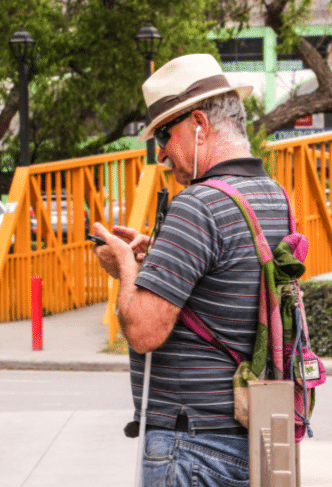
Jim outside the Gran Aki in Loja, just before he met me.
“Jim?” I ask. He turns his head, his eyes hidden behind dark glasses and exclaims: “Oh it’s good to see you! How are you this beautiful afternoon?”
Born in Massachusetts, United States, in 1956, Jim Paradiso is now living by himself in Loja, in southern Ecuador. What many people may find hard to believe is that Jim is legally blind and does not know any Spanish. “Every day is a new adventure!” he says as he leads the way through heavily trafficked roads, passing roadwork obstacle with incredible speed for what would be expected from a blind person. He uses his cane like an instrument while listening to a revolutionary cell phone application that blind people use to navigate their perilous world through his plugged-in earpiece.
We arrive at the gate to the city and he starts walking up the stone-carved stairs, this time in a slower pace, bumping the end of his cane at every step. When we reach the top of the gate with its turret-styled walls, a spectacular view of Loja unfolds before us. “Isn’t it beautiful?” he sighs.
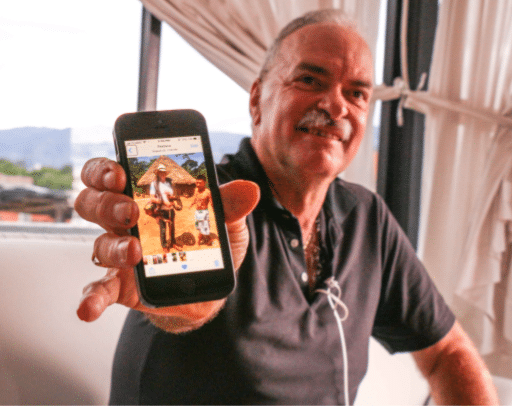
Jim showing me a picture of him holding a boa constrictor in the Amazon.
In 2014, Jim had a brain aneurysm that left him completely blind in his left eye and with 20/800 vision in his right. Shortly before that, he had lost both his twenty-year marriage and the last of his many businesses. When he was finally granted disability status by the U.S. Social Security system, Jim sold everything he had left and flew to Ecuador.
It was not a good start, however. After a walk on a searing Ecuadorian beach, he ended up with third-degree burns on his feet due to his peripheral neuropathy, a nerve disease which impairs the feeling of pain on the bottoms of his feet. While he was on the coast, he would also catch a flesh-eating bacteria called necrotising fasciitis that has a 75% mortality rate.
In July 2015 he flew back to the U.S. and had two toes amputated along with all of the infected skin on the bottom of his feet at a hospital in Gainesville, Florida. At one stage he was told that they would have to amputate his entire foot, although they managed to save it by using skin grafts from other parts of his body. Within ten weeks he had undergone five different operations. During the examinations, doctors found that Jim had skin cancer on his back and an abscess on the back of his head, which they soon discovered was a tumor. All the potentially diseased flesh was removed.
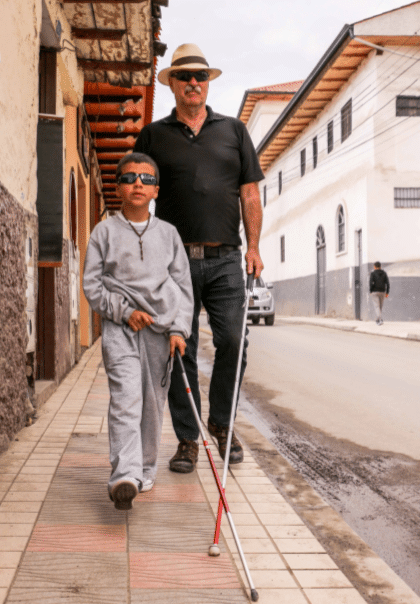
Jim walking with a friend in Loja.
About a year after his return to the States and five months after his last operation, Jim decided it was time to return to South America. He traveled to Peru, Colombia, the Galapagos islands, Panama, Costa Rica and Jamaica during a six-month tour with a friend.
In early 2017 he returned to Ecuador, where he decided to make his home. “There are people who don’t believe that I have actually done the things I have,” Jim says. “They think I’m making it all up. And that’s fine. But the thing is … I’m not.”
Three days every week, Jim works as a volunteer at the Instituto Especial Byron Eguiguren, the only elementary school for disabled children in Loja. Because of budget cuts, the school’s mobility trainer was was let go several years ago. In April 2017, after he posted on his Facebook page: “What is there to do for a blind man living alone in Loja?” Jim made contact with one of the elementary school’s teachers and volunteered himself as their new mobility trainer.
“What are your qualifications?” she asked. “Well, I’m blind and I’m mobile,” he answered. Today, he takes the school’s blind students out for walks around the city.
“I need to stand on my own two feet,” Jim says. “And that’s what I’m trying to relate to these kids. Stand on your own feet and enjoy yourself. You’ve only got one life. This is what God, or Life, has dealt you. So go with it!”
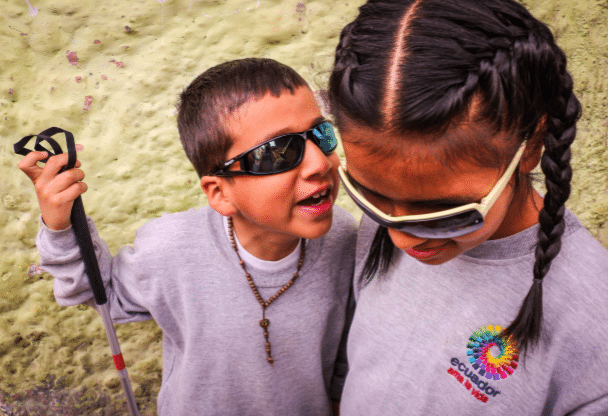
Nine-year-old Willie and eleven-year-old Naomi in an intriguing conversation.
As we are standing on top of the gate, the city spread out in front of us, Jim starts telling me stories about the children at the elementary school, his voice dropping low and serious. He tells me about Naomi, who recoiled at the slightest human touch when she first arrived at the school two years ago. She is now eleven years old, and no longer fears human contact. He tells me about nine-year-old Willie, who lost both eyes because of cancer. And he tells me about Jonathan, who was kept isolated for eight years because of a brain tumor that had left him blind and who now, embraces every person he meets, starved for any kind of contact.
“You can either choose to stay home and feel sorry for yourself, or you can do something,” Jim says. “If somebody chooses to feel sorry for themselves and do nothing, that’s their choice. I’m here to say, you don’t have to.”
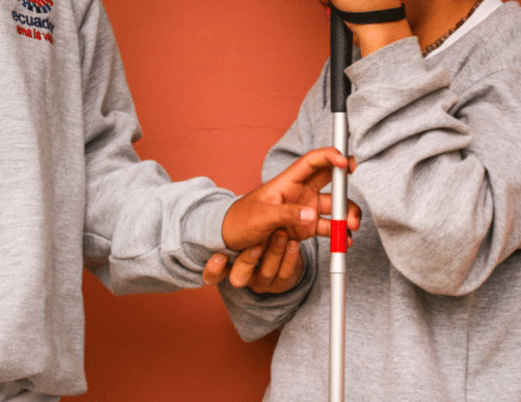
Helping blind children is Jim’s passion.
To prove his point, Jim has started a fund-raising campaign to supply the children with iPhones to help them them become more independent by using apps such as Seeing AI and Google Maps. By using the iPhone camera, the blind can tell you how much money they have in their hand, identify objects and even know the color of someone’s clothes. “Everything that you can do, I can do too — except see,” Jim says.
According to the World Health Organization, there are 253 million people in the world living with visual impairment. In Ecuador, roughly 467,000 people live with moderate or severe visual impairment, according to The IAPB Vision Atlas.
In 2014, a team of students from ESPE in Loja launched a groundbreaking support device for visually impaired people, called HandEyes. The device uses sound waves to help create mental maps of the user’s environment and thus, helps them to avoid accidents. This phenomenon is called Echolocation, and is used naturally by low-vision animals such as bats and whales. HandEyes also contains a scanner which allows the user to locate objects in their surroundings by emitting sounds that determine how far away they are.. By excluding additional functions of the device, such as color recognition, MP3-player, games etc., HandEyes has become more affordable to people in low-income countries, which are the ESPE team’s target audience.
There have been several efforts made by the Ecuadorian government to increase opportunities for disabled people. In 2016, Ecuador signed the Marrakech Treaty which provides free access to literature written for people with visual disabilities or difficulties in handling books. In addition, Ecuadorian law stipulates that four percent of public and private employees should be people with disabilities. However, even though the targets have been met, much work remains to be done.
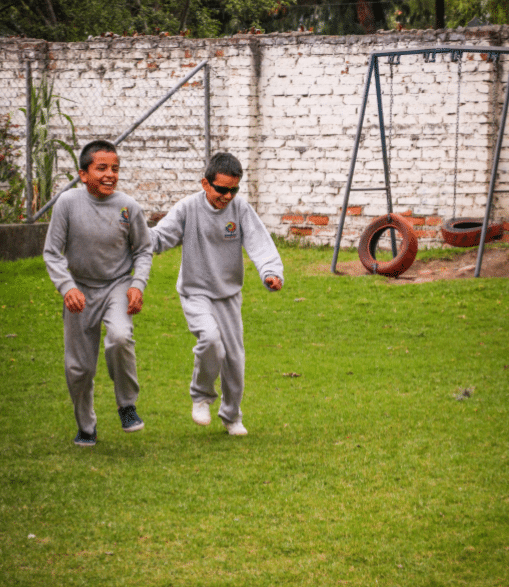
Two of Jim’s friends on the playground.
In April 2017, Ecuador became the first country in Latin America to elect a person with paraplegia as its head of state. The president, Lenin Moreno, has become a symbol for the ongoing battle against discrimination of those who live with disabilities. There has been, however, some criticism directed toward the president for not following through on all of his promises.
The day after I met him, Jim takes me to the elementary school. It has twenty-three students, varying in age from of five to sixteen, the majority of them blind. The first thing that I notice is the threatening layer of broken glass covering the top of the thick stone-walls, as we approach the school. “Not sure if it’s to stop people from coming in or to keep kids from going out,” Jim says. He rings a loud bell and we are let into the humble school yard, a patch of grass surrounded by low buildings and the thick stone wall.
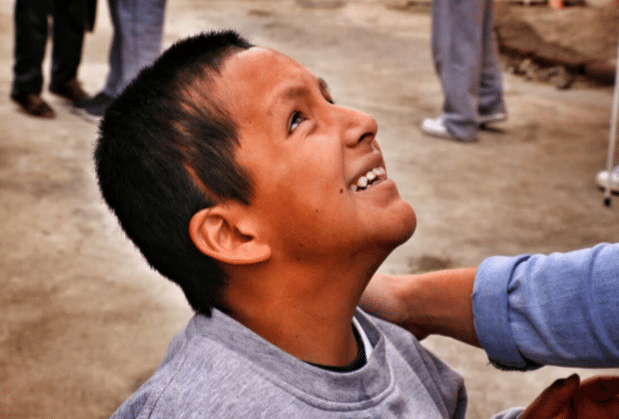
Sixteen-year-old Jonathan, smiling at one of the school’s volunteers.
I am introduced to Willie and Naomi who are standing very close to each other, conversing in low voices. Then, I meet Jonathan. I bend down and the little boy embraces me naturally, as if it is the one thing he is meant to be doing. He hugs me tight but softly, kisses my cheek and says something in Spanish that I cannot understand. What I can understand is that his voice reveals his pain, but it is also filled by an endless gratitude for the opportunity of human contact. I would never have guessed that he was sixteen years old.
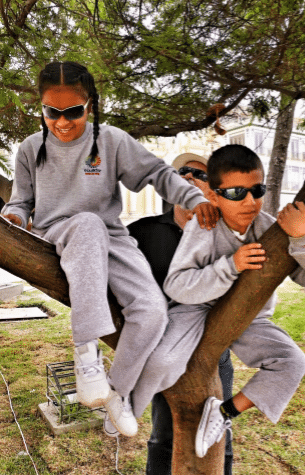
Jim with two tree-climbers.
Jim, another volunteer and I then go for a walk in the city with Willie and Naomi, Jim taking the lead. I see Willie confidently following the sound of Jim’s cane sliding along the concrete sidewalk, skillfully avoiding the many obstacles he encounters. Naomi is more hesitant, always walking behind us, at a slower pace. I need to use all of my willpower not to scream out a warning for every car that darts by when we’re crossing a street, or for each meter-deep hole we pass on the crumbling sidewalk. After about thirty minutes of walking, we arrive at Parque de Central, stopping by Willie’s favorite climbing tree. Jim lifts him up and he wraps his arms around a reliable branch, feeling the grainy bark beneath his fingers. Naomi also allows herself to be lifted up as well. Both children sit in the tree, laughing and speaking excitedly with each other.
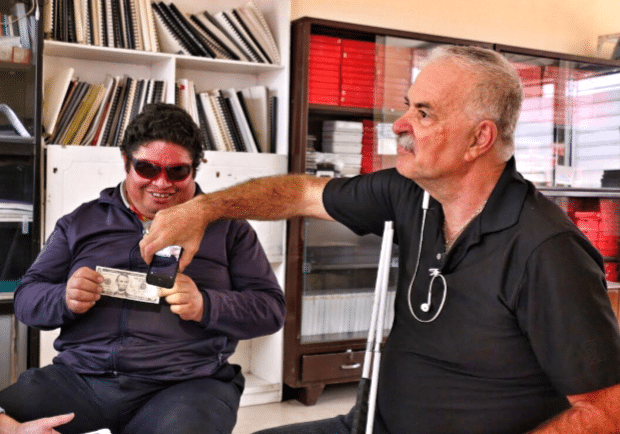
Jim depends on his iPhone.
When we return to the school, Jim sits down with the school’s technician, Carlos, to show him the latest updates of the Seeing AI app on the iPad Jim has donated to the school. As he does not know Spanish and Carlos does not know English, the school’s English teacher translates for them. Jim demonstrates how the iPad recognizes the five dollar bill he holds beneath its camera, can tell us the color of the English teacher’s jacket and even locate the door. Seeing AI is a free app, using artificial intelligence to narrate the world around its user. The app continues to grow through ongoing research, having new functions added continuously. Jim’s goal is to get each student an iPhone of their own, allowing them more independence than a cane can provide. An additional iPad and two iPhones will be shipped in and donated to the school by the end of the year, Jim explains.
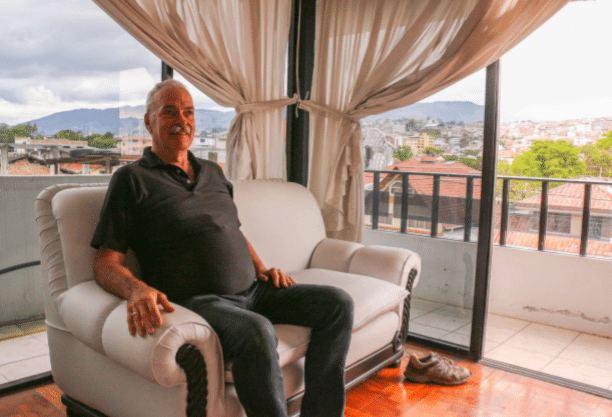
Jim relaxes in his apartment.
We then leave the school, I follow Jim to his apartment, which looks like something straight out of Playboy Magazine. Tall windows present a breathtaking view of the city, the furniture is bright and luxurious. Above the king-sized bed, placed in the middle of the apartment, hangs a tasteful painting of a nude woman. When we sit down in the plush, white leather sofas to talk, Jim admits that his landlady gave him an exceptionally good deal on the rent.
Only two weeks before our interview, Jim had suffered a stroke after helping with a fundraising dinner in Cuenca to support children with HIV. The stroke happened on the same day we had agreed to get in touch and so, when I called him, there was no answer. He called me back, however, an hour later, asking with his usual perky voice: “How are you this beautiful afternoon?” He was still at the hospital when he called. A week later, he returned to Loja, deciding it was time for him to get back on his feet.
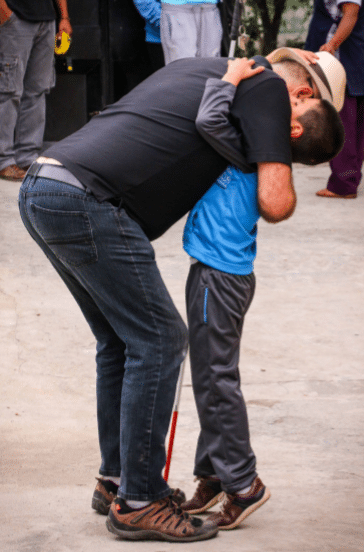
A hug from a friend.
In the midst of his apartment, Jim asks me: “How do you put words or monetary value to Jonathan? You know, ‘I love you. You’re beautiful. Please be my friend. Thank you.’ How do you put into words the fact that Naomi will let me pick her up, and not be afraid of somebody touching her? Well… you can’t!”
Then, he tells me about some of the adventures he has come across while traveling in South America. Visiting ancient Inca ruins, dining with the winning Olympics Brazilian football team, and holding a boa constrictor in the Amazon’s wilderness have all been a part of his adventure.
“You know, too many people sit around and feel sorry for themselves. I can’t do that, it’s not worth it, it’s not in me. I want to live until I die!
If you would like to make a donation to Jim’s project, go to https://www.gofundme.com/3noxfco
__________________
Angie Gray is an aspiring 19-year-old photographer, filmmaker, and writer. She comes from a Swedish family of travelers and has developed a growing passion for exploring new cultures and new countries. She hopes to follow her passion by telling stories through images, film and the written word.
Sources
• HandEyes’ official Facebook page • McBride, S. Wheelchair User Lenin Moreno Elected President of Ecuador. New Mobility. Published 5/4/2017. URL: http://www.newmobility.com/2017/04/wheelchairuser-lenin-moreno-elected-president-ecuador/
• Ministerio de Relaciones Exteriores y Movilidad Humana. Ecuador among the first countries to ensure opportunities for visually impaired people. Published 22/8/2016. URL: http://www.cancilleria.gob.ec/en/ecuador-among-the-first-countries-to-ensureopportunities-for-visually-impaired-people/
• Vision Atlas. Global Vision Database Maps. Launched 12/10/2017. URL: http:// atlas.iapb.org/gvd-maps/#by-condition
• World Bank Group. Ecuador: People with Disabilities Fight for Real Inclusion. Published 23/1/2012. URL: http://www.worldbank.org/en/news/feature/2012/01/23/ ecuador-people-with-disabilities-fight-for-real-inclusion • World Health Organisation. Vision impairment and blindness. Updated 10/2017. URL: http://www.who.int/mediacentre/factsheets/fs282/en





















